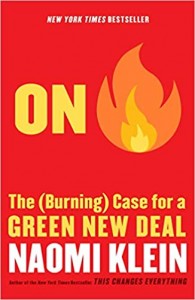From the Reviews of Eric Klinenberg, New York Review of Books, March 26, 2020
Naomi Klein’s 2014 book, This Changes Everything: Capitalism vs. the Climate, became a touchstone of progressive climate activism. It’s the single strongest statement we have for why carbon-fueled capitalism (or “extractivism”), with its imperative of relentless growth and exploitation, is fundamentally incompatible with ecological sustainability and social justice. Klein skewers not only neoliberal policymakers and fossil fuel companies, but also “Big Green” organizations, including the Nature Conservancy and the Environmental Defense Fund, for accepting funds from major polluters and failing to support rapid decarbonization. Her title is her argument: if we want to escape the climate catastrophe, nothing short of radical change will do.
The Green New Deal is the policy that Klein could not quite envision in This Changes Everything, and On Fire should be read as that book’s coda. Klein now sees the GND as the only realistic way to address the current climate emergency. She advocates a sweeping, comprehensive GND —one that includes an extensive social reorganization through new infrastructure, decarbonization, wealth redistribution, reparations, resource sharing, guaranteed jobs, child care, and healthcare for all.
Strategies like carbon taxation, cap and trade, and urban planning for extreme weather and disasters are, she says, insufficient and doomed to fail. Klein does not propose specific policies or analyze the details of current GND proposals. But the sum total of her demands — the things we “must” do to manage the climate crisis and promote social equity — would place her somewhere to the left of AOC and Bernie Sanders. “Change everything” remains her rallying cry.
At first glance, On Fire is nowhere near as ambitious as Klein’s other books. After its rousing introduction, the book is a mishmash of short, uneven pieces on subjects ranging from suffocating wildfires on the West Coast to the 2015 papal encyclical on climate. It does not propose a master narrative to explain the current situation. It lacks the deep reporting that distinguishes her most influential work.
It’s repetitive and unfairly dismissive of some genuinely difficult scientific and political questions that deserve more open debate: To what extent should we invest in or begin regulating geo-engineering projects for sunlight reflection to cool the earth or cloud brightening to refreeze warming polar regions, if they become necessary? How will states compel citizens to consume differently and reduce what are, for now, the conventional standards of good living? And how do we build the common ground that is necessary for tackling the climate crisis, and persuade people who are not already behind the Green New Deal that it’s our best hope?
Yet Klein is a talented polemicist, and On Fire is a powerful manifesto. Readers with a more scholarly disposition may be put off by her admonitions and instructions, but Klein isn’t trying to win over the seminar room or the swing voter. She wants to catalyze a movement, and her gambit is that On Fire will be as effective for today’s political fight over climate as her 1999 book, No Logo, was in the anti-globalization campaign.
What it will not do is persuade skeptics, including people who care about global warming but don’t share Klein’s politics, that a GND is politically feasible, given the vehement right-wing opposition to it as well as the enormous costs associated with the Covid-19 pandemic response and recovery. It offers no coherent strategy for overcoming partisan opposition to progressive environmental and economic policies, no likely pathways to the more just, sustainable world Klein wants to build. This is unfortunate, because we’re unlikely to get a Green New Deal without a widespread, reinvigorated belief in public goods, such as programs to promote healthy cities and environments.
But the coronavirus pandemic has upended conventional politics and created possibilities for genuine social change, albeit in either direction. If ever there were an opportunity to advocate for new social and economic models, this is it.

